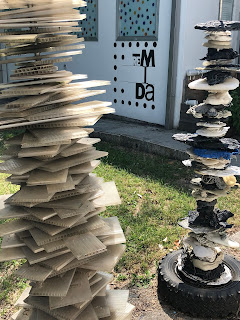Bruno Munari workshop - University of Bologna

Bruno Munari workshop - Chiara Baldassarre, University of Bologna Munari was a Milanese artist, painter, designer, and pedagogue; an illustrator and creator of books for children and adults. He is the first to provoke and invent children's art workshops in museums. His art was playful, as he looked at objects from a new perspective and used them in extraordinary and original ways. Using a slides provides a smaller area to create. Art is projected onto the wall to provide a new perspective. Manipulation of materials of different textures/colors creates a variety of effects. This method is provides another medium for expression. Children can be challenged to make a continuation slides of a similar nature. Children are then asked to 'tell a story' about their work.





